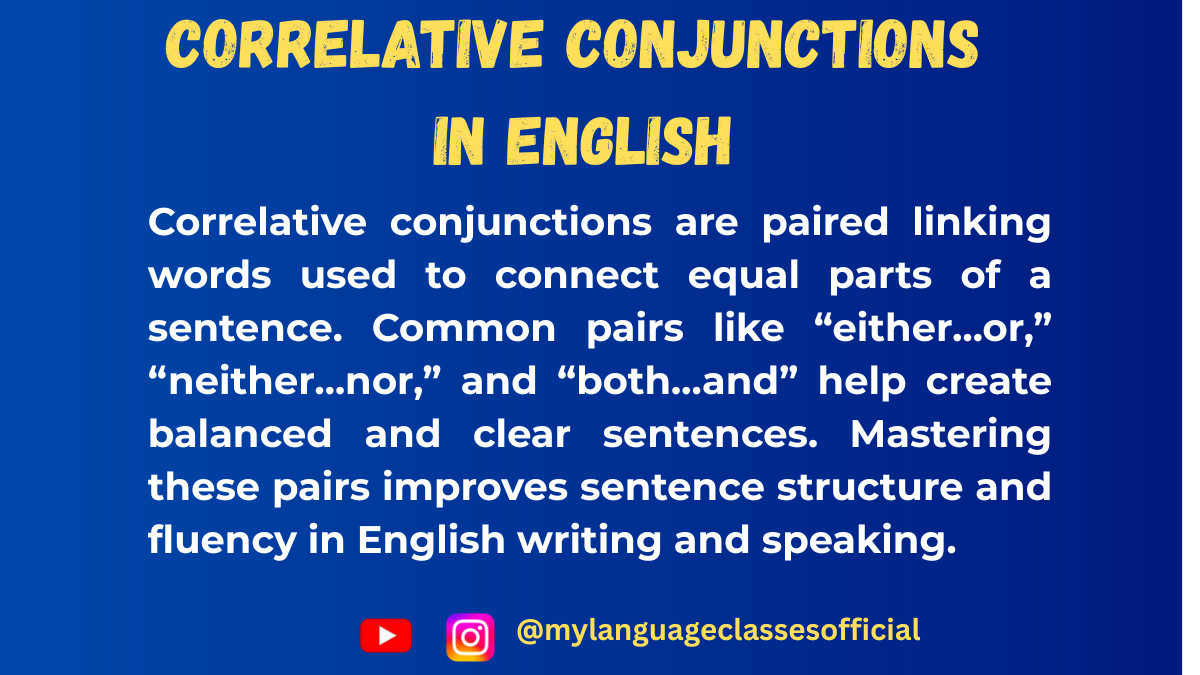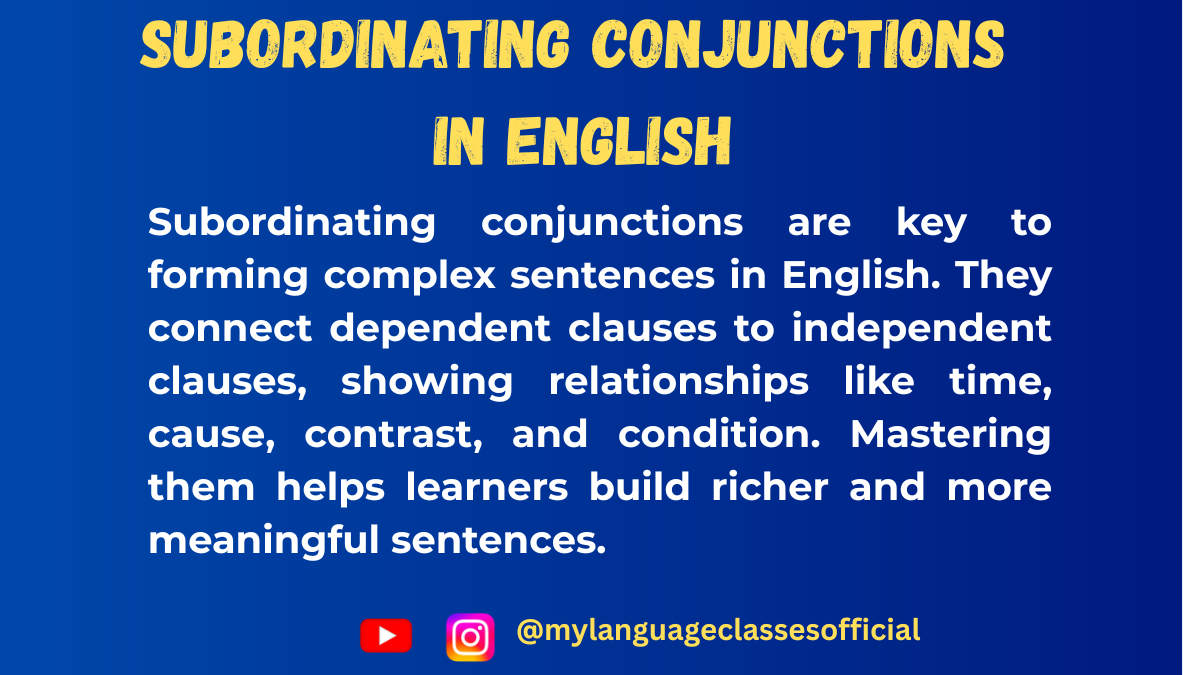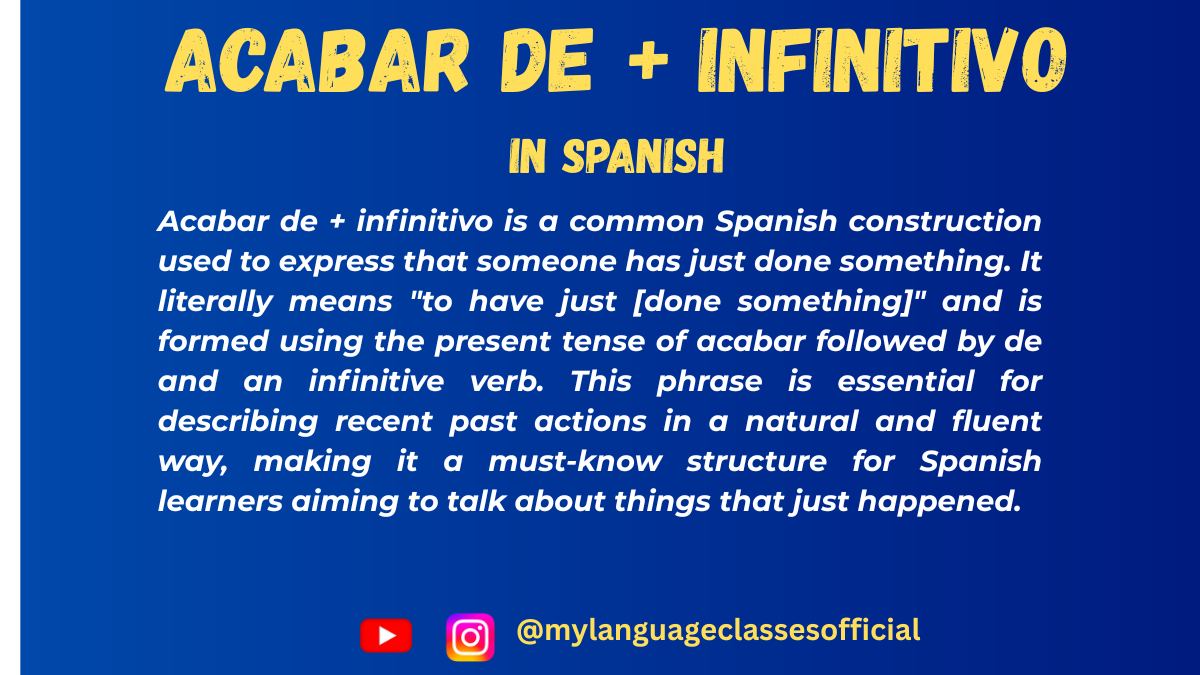Your cart is currently empty!
Tag: My English class
-
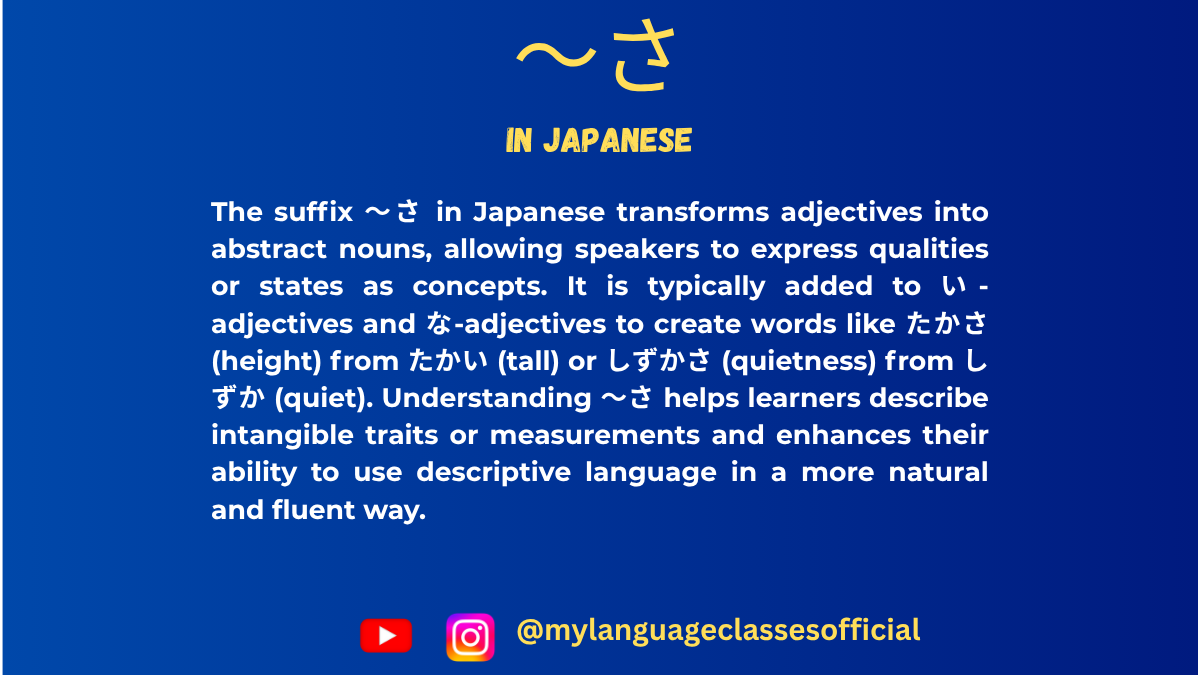
Understanding 〜さ: The Nominalizer for Adjectives | My Language Classes
Using 〜さ as a Nominalizer
When learning Japanese, one of the most useful grammatical tools you’ll encounter is the nominalizer 〜さ. This simple yet powerful suffix transforms adjectives into nouns, allowing you to express concepts like “height,” “beauty,” or “difficulty” in a clear and concise way.
In this blog post, we’ll dive deep into the meaning, formation, and usage of 〜さ, along with plenty of examples to help you master this essential Japanese grammar point.
What is 〜さ?
In Japanese, 〜さ is a nominalizer that turns adjectives into nouns. It is used to express the degree, state, or quality of something. For example, the adjective 高い (takai), meaning “high” or “expensive,” becomes 高さ (takasa), which means “height” or “cost.” This makes 〜さ incredibly useful for describing abstract concepts or measurable qualities.
Formation of 〜さ
The formation of 〜さ is straightforward, but it varies slightly depending on the type of adjective or word it’s attached to. Let’s break it down:
1. With い-Adjectives (i-Adjectives)
Remove the final い (i) and add さ (sa).
Example:- 高い (takai) → 高さ (takasa)
- 楽しい (tanoshii) → 楽しさ (tanoshisa)
2. With な-Adjectives (na-Adjectives)
Remove the な (na) and add さ (sa).
Example:- 静か (shizuka) → 静かさ (shizukasa)
- 便利 (benri) → 便利さ (benrisa)
3. With Nouns
〜さ is rarely used with nouns directly, but it can be added to noun-like adjectives (e.g., 元気 → 元気さ).
Usage of 〜さ
The 〜さ form is used in various situations to express the degree, state, or quality of something. Here are some common scenarios:
- Describing Physical Attributes
- この山の高さはどれくらいですか?
(Kono yama no takasa wa dore kurai desu ka?)
How high is this mountain?
- この山の高さはどれくらいですか?
- Expressing Abstract Qualities
- 彼女の優しさに感動しました。
(Kanojo no yasashisa ni kandou shimashita.)
I was moved by her kindness.
- 彼女の優しさに感動しました。
- Comparing Degrees or Levels
- この問題の難しさはレベルが高い。
(Kono mondai no muzukashisa wa reberu ga takai.)
The difficulty level of this problem is high.
- この問題の難しさはレベルが高い。
- Emphasizing a State or Condition
- この部屋の広さは十分です。
(Kono heya no hirosa wa juubun desu.)
The spaciousness of this room is sufficient.
- この部屋の広さは十分です。
List of Adjectives with 〜さ Form
Here’s a table showcasing common words with their 〜さ forms, along with example sentences:
Original Word 〜さ Form Example Sentence (Japanese) Romaji English Meaning 高い (takai) 高さ (takasa) このビルの高さはすごい。 Kono biru no takasa wa sugoi. The height of this building is amazing. 楽しい (tanoshii) 楽しさ (tanoshisa) 旅行の楽しさは言葉では表せない。 Ryokou no tanoshisa wa kotoba de wa arawasenai. The joy of traveling cannot be expressed in words. 静か (shizuka) 静かさ (shizukasa) この公園の静かさが好きです。 Kono kouen no shizukasa ga suki desu. I like the quietness of this park. 便利 (benri) 便利さ (benrisa) このアプリの便利さに驚いた。 Kono apuri no benrisa ni odoroita. I was amazed by the convenience of this app. 元気 (genki) 元気さ (genkisa) 彼の元気さはみんなの励みになる。 Kare no genkisa wa minna no hagemi ni naru. His energy motivates everyone.
More Example Sentences
Here are 10 additional examples to help you understand the usage of 〜さ in context:
- この湖の深さはどのくらいですか?
(Kono mizuumi no fukasa wa dono kurai desu ka?)
How deep is this lake? - 彼の強さは誰にも負けない。
(Kare no tsuyosa wa dare ni mo makenai.)
His strength is unmatched by anyone. - この料理の辛さはちょうどいい。
(Kono ryouri no karasa wa choudo ii.)
The spiciness of this dish is just right. - この町の暖かさが好きです。
(Kono machi no atatakasa ga suki desu.)
I love the warmth of this town. - この仕事の大変さを理解しています。
(Kono shigoto no taihensa o rikai shiteimasu.)
I understand the difficulty of this job. - 彼女の美しさは言葉では表せない。
(Kanojo no utsukushisa wa kotoba de wa arawasenai.)
Her beauty cannot be expressed in words. - この本の面白さに夢中になった。
(Kono hon no omoshirosa ni muchuu ni natta.)
I became engrossed in the interestingness of this book. - この問題の複雑さに悩んでいます。
(Kono mondai no fukuzatsusa ni nayandeimasu.)
I’m struggling with the complexity of this problem. - この海の青さは忘れられない。
(Kono umi no aosa wa wasurerarenai.)
I can’t forget the blueness of this sea. - このケーキの甘さは控えめです。
(Kono keeki no amasa wa hikaeme desu.)
The sweetness of this cake is mild.
Things to Keep in Mind
- 〜さ vs. 〜み: While both 〜さ and 〜み can nominalize adjectives, 〜さ is more commonly used for measurable or objective qualities, whereas 〜み often conveys a more subjective or emotional nuance.
- Avoid Overuse: 〜さ is versatile, but overusing it can make your speech or writing sound repetitive.
- Context Matters: Always consider the context when using 〜さ, as it may not always be the most natural choice.
Fill in the Blanks
Test your understanding of 〜さ with these fill-in-the-blank questions:
- この川の______はどれくらいですか。(深い)
- 彼の______に感動しました。 (優しい)
- この問題の______は高いです。 (難しい)
- この部屋の______は十分です。 (広い)
- 彼女の______は誰にも負けない。 (強い)
- この料理の______はちょうどいい。 (辛い)
- この町の______が好きです。 (暖かい)
- この仕事の______を理解しています。 (大変)
- この海の______は忘れられない。 (青い)
- このケーキの______は控えめです。 (甘い)
Answers:
- 深さ
- 優しさ
- 難しさ
- 広さ
- 強さ
- 辛さ
- 暖かさ
- 大変さ
- 青さ
- 甘さ
Conclusion
Mastering the 〜さ nominalizer is a key step in becoming fluent in Japanese. It allows you to express abstract qualities and measurable attributes with ease, making your speech and writing more nuanced and precise. By practicing the examples and understanding the formation rules, you’ll soon find yourself using 〜さ naturally in everyday conversations. Keep practicing, and don’t forget to pay attention to context and nuance!
If you enjoyed this lesson, be sure to check out more posts like this on my blog at My Language Classes. Don’t forget to subscribe my YouTube channel and follow me on Instagram for the latest language learning tips and lessons. Leave a comment below to share your thoughts, or ask any questions you have about nouns.
Happy learning! 😊
-
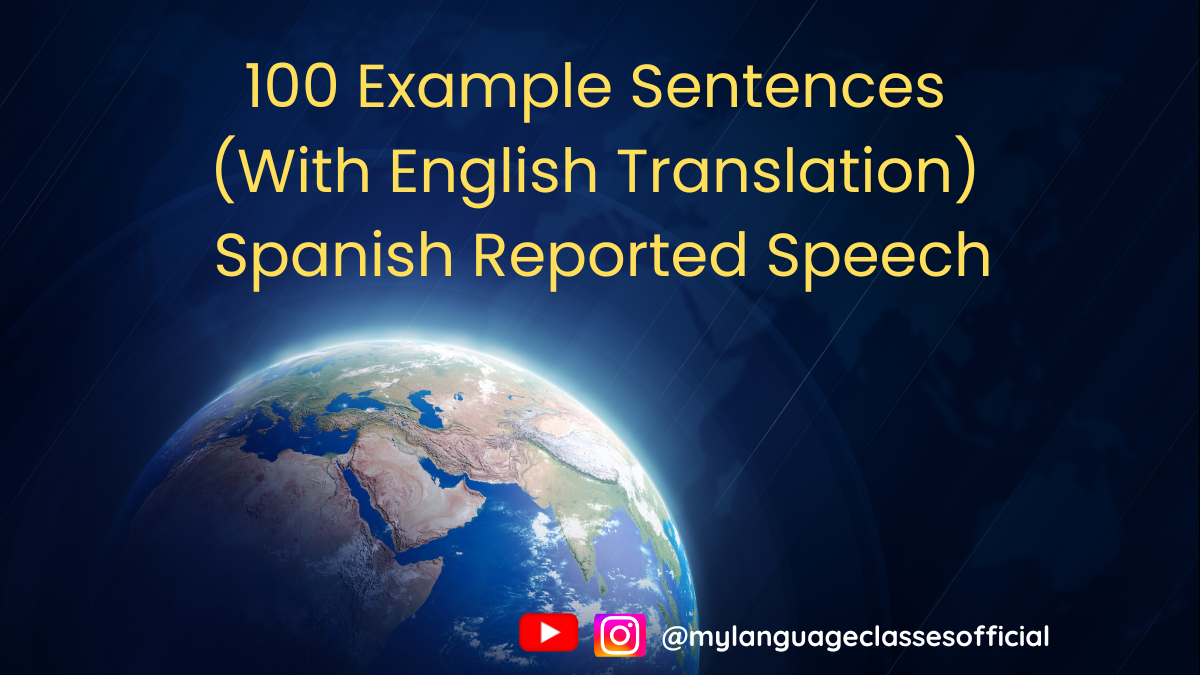
100 Example Sentences of Reported Speech (Estilo Indirecto) in Spanish | My Language Classes
Example Sentences of Reported Speech (Estilo Indirecto) in Spanish
Reported speech, or estilo indirecto, is a key aspect of Spanish grammar that allows us to relay what someone else has said without quoting their exact words. Whether you’re sharing a conversation, recounting a story, or summarizing someone’s thoughts, mastering estilo indirecto is essential for effective communication in Spanish.
In this blog post, we’ve compiled 100 example sentences of reported speech in Spanish. These examples cover a variety of contexts, including statements, questions, commands, and thoughts. Whether you’re a beginner or an advanced learner, these sentences will help you understand and practice estilo indirecto in real-life situations.
100 Example Sentences of Reported Speech in Spanish
Here are 100 example sentences of reported speech in Spanish, categorized by type (statements, questions, commands, and thoughts). Each sentence is accompanied by its English translation for clarity.
Statements (Declaraciones)
- Dijo que tenía hambre.
- He said he was hungry.
- Ella comentó que le gustaba el café.
- She mentioned she liked coffee.
- Juan explicó que no podía venir.
- Juan explained he couldn’t come.
- Ellos aseguraron que terminarían el proyecto.
- They assured they would finish the project.
- Mi mamá dijo que cocinaría la cena.
- My mom said she would cook dinner.
- El profesor explicó que el examen era difícil.
- The teacher explained that the exam was difficult.
- Dijeron que llovería mañana.
- They said it would rain tomorrow.
- Ella afirmó que había estudiado mucho.
- She claimed she had studied a lot.
- Carlos dijo que no sabía la respuesta.
- Carlos said he didn’t know the answer.
- Nos contaron que habían viajado a España.
- They told us they had traveled to Spain.
Questions (Preguntas)
- Me preguntó si quería café.
- He asked me if I wanted coffee.
- Ella quería saber si habías terminado la tarea.
- She wanted to know if you had finished the homework.
- Preguntó cuándo llegaría el tren.
- He asked when the train would arrive.
- Me preguntaron dónde vivía.
- They asked me where I lived.
- Quería saber por qué no habías llamado.
- He wanted to know why you hadn’t called.
- Preguntó si podía ayudarle.
- He asked if he could help her.
- Ella me preguntó si conocía a María.
- She asked me if I knew María.
- Querían saber cómo había sido el viaje.
- They wanted to know how the trip had been.
- Preguntó qué hora era.
- He asked what time it was.
- Me preguntó si había visto la película.
- He asked me if I had seen the movie.
Commands and Requests (Órdenes y Peticiones)
- Me pidió que cerrara la puerta.
- He asked me to close the door.
- Ella me dijo que no hablara tan alto.
- She told me not to speak so loudly.
- El jefe me ordenó que terminara el informe.
- The boss ordered me to finish the report.
- Mi mamá me pidió que lavara los platos.
- My mom asked me to wash the dishes.
- Me sugirió que descansara un poco.
- He suggested I rest a little.
- El profesor nos dijo que estudiáramos más.
- The teacher told us to study more.
- Me pidieron que les ayudara.
- They asked me to help them.
- Ella me dijo que no me preocupara.
- She told me not to worry.
- El médico me recomendó que bebiera más agua.
- The doctor recommended I drink more water.
- Me pidió que le llamara más tarde.
- He asked me to call him later.
Thoughts and Feelings (Pensamientos y Sentimientos)
- Pensé que no vendrías.
- I thought you wouldn’t come.
- Creí que era tarde.
- I thought it was late.
- Ella dijo que estaba cansada.
- She said she was tired.
- Me dijo que estaba feliz.
- He told me he was happy.
- Pensé que no sabías la respuesta.
- I thought you didn’t know the answer.
- Creí que habías terminado.
- I thought you had finished.
- Ella dijo que tenía miedo.
- She said she was scared.
- Me contó que estaba emocionado.
- He told me he was excited.
- Pensé que no te gustaba el café.
- I thought you didn’t like coffee.
- Creí que no querías venir.
- I thought you didn’t want to come.
Mixed Examples (Ejemplos Variados)
- Dijo que no había visto la película.
- He said he hadn’t seen the movie.
- Ella me preguntó si había ido al concierto.
- She asked me if I had gone to the concert.
- Me pidió que le explicara el problema.
- He asked me to explain the problem to him.
- Pensé que no habías recibido el mensaje.
- I thought you hadn’t received the message.
- Dijeron que no tenían tiempo.
- They said they didn’t have time.
- Me preguntó si podía prestarle dinero.
- He asked me if I could lend him money.
- Ella dijo que no quería ir.
- She said she didn’t want to go.
- Me pidieron que les contara la historia.
- They asked me to tell them the story.
- Pensé que no te gustaba el helado.
- I thought you didn’t like ice cream.
- Dijo que no había comido nada.
- He said he hadn’t eaten anything.
More Examples (Más Ejemplos)
- Ella me dijo que no sabía nadar.
- She told me she didn’t know how to swim.
- Me preguntó si había estado en París.
- He asked me if I had been to Paris.
- Dijo que no había terminado el libro.
- He said he hadn’t finished the book.
- Ella me pidió que le ayudara con la tarea.
- She asked me to help her with the homework.
- Pensé que no habías entendido.
- I thought you hadn’t understood.
- Dijeron que no podían venir a la fiesta.
- They said they couldn’t come to the party.
- Me preguntó si había visto a Juan.
- He asked me if I had seen Juan.
- Ella dijo que no quería hablar del tema.
- She said she didn’t want to talk about the subject.
- Me pidieron que les esperara.
- They asked me to wait for them.
- Pensé que no te gustaba el fútbol.
- I thought you didn’t like soccer.
Complex Examples (Ejemplos Complejos)
- Dijo que no había recibido el correo.
- He said he hadn’t received the email.
- Ella me preguntó si había comprado el regalo.
- She asked me if I had bought the gift.
- Me pidió que le explicara cómo funcionaba.
- He asked me to explain how it worked.
- Pensé que no habías escuchado la noticia.
- I thought you hadn’t heard the news.
- Dijeron que no tenían suficiente dinero.
- They said they didn’t have enough money.
- Me preguntó si podía acompañarle.
- He asked me if I could accompany him.
- Ella dijo que no quería salir.
- She said she didn’t want to go out.
- Me pidieron que les contara un chiste.
- They asked me to tell them a joke.
- Pensé que no te gustaba el té.
- I thought you didn’t like tea.
- Dijo que no había dormido bien.
- He said he hadn’t slept well.
Advanced Examples (Ejemplos Avanzados)
- Ella me dijo que no sabía qué hacer.
- She told me she didn’t know what to do.
- Me preguntó si había hablado con el jefe.
- He asked me if I had spoken to the boss.
- Dijo que no había entendido la explicación.
- He said he hadn’t understood the explanation.
- Ella me pidió que le enseñara a cocinar.
- She asked me to teach her how to cook.
- Pensé que no habías visto el mensaje.
- I thought you hadn’t seen the message.
- Dijeron que no podían ayudarnos.
- They said they couldn’t help us.
- Me preguntó si había terminado el informe.
- He asked me if I had finished the report.
- Ella dijo que no quería discutir.
- She said she didn’t want to argue.
- Me pidieron que les mostrara el camino.
- They asked me to show them the way.
- Pensé que no te gustaba el queso.
- I thought you didn’t like cheese.
Final Examples (Ejemplos Finales)
- Dijo que no había recibido la invitación.
- He said he hadn’t received the invitation.
- Ella me preguntó si había reservado la mesa.
- She asked me if I had reserved the table.
- Me pidió que le explicara por qué estaba triste.
- He asked me to explain why I was sad.
- Pensé que no habías entendido la pregunta.
- I thought you hadn’t understood the question.
- Dijeron que no tenían tiempo para ayudarnos.
- They said they didn’t have time to help us.
- Me preguntó si podía prestarle mi coche.
- He asked me if I could lend him my car.
- Ella dijo que no quería ir al cine.
- She said she didn’t want to go to the movies.
- Me pidieron que les contara mi experiencia.
- They asked me to tell them about my experience.
- Pensé que no te gustaba el vino.
- I thought you didn’t like wine.
- Dijo que no había comido desde la mañana.
- He said he hadn’t eaten since morning.
- Juan dijo que tenía mucha hambre.
- (Juan said that he was very hungry.)
- María comentó que había viajado a España el año pasado.
- (María commented that she had traveled to Spain last year.)
- Pedro explicó que no podía asistir a la reunión.
- (Pedro explained that he couldn’t attend the meeting.)
- Ana me dijo que compraría un coche nuevo el próximo mes.
- (Ana told me that she would buy a new car next month.)
- El profesor mencionó que los estudiantes habían hecho un buen trabajo.
- (The teacher mentioned that the students had done a good job.)
- Mi madre me recordó que tenía que llevar un abrigo porque hacía frío.
- (My mother reminded me that I had to wear a coat because it was cold.)
- Carlos aseguró que habría una fiesta el sábado.
- (Carlos assured that there would be a party on Saturday.)
- Sofía contó que había visto una película muy interesante.
- (Sofía said that she had seen a very interesting movie.)
- Ellos dijeron que llegarían tarde a la cena.
- (They said that they would arrive late to dinner.)
- El jefe anunció que habría cambios en la empresa.
- (The boss announced that there would be changes in the company.)
Conclusion
These 100 example sentences of reported speech in Spanish provide a comprehensive resource for understanding and practicing estilo indirecto. Whether you’re reporting statements, questions, commands, or thoughts, these examples will help you communicate more effectively in Spanish.
Keep practicing, and soon you’ll be using estilo indirecto like a native speaker! ¡Buena suerte! (Good luck!)
If you found this guide helpful, I’d love to hear from you! Share your thoughts in the comments below or connect with me on social media. For more tips, resources, and inspiration, visit my blog at mylanguageclassesblog.wordpress.com. Follow on Instagram and subscribe on YouTube
- Dijo que tenía hambre.
-
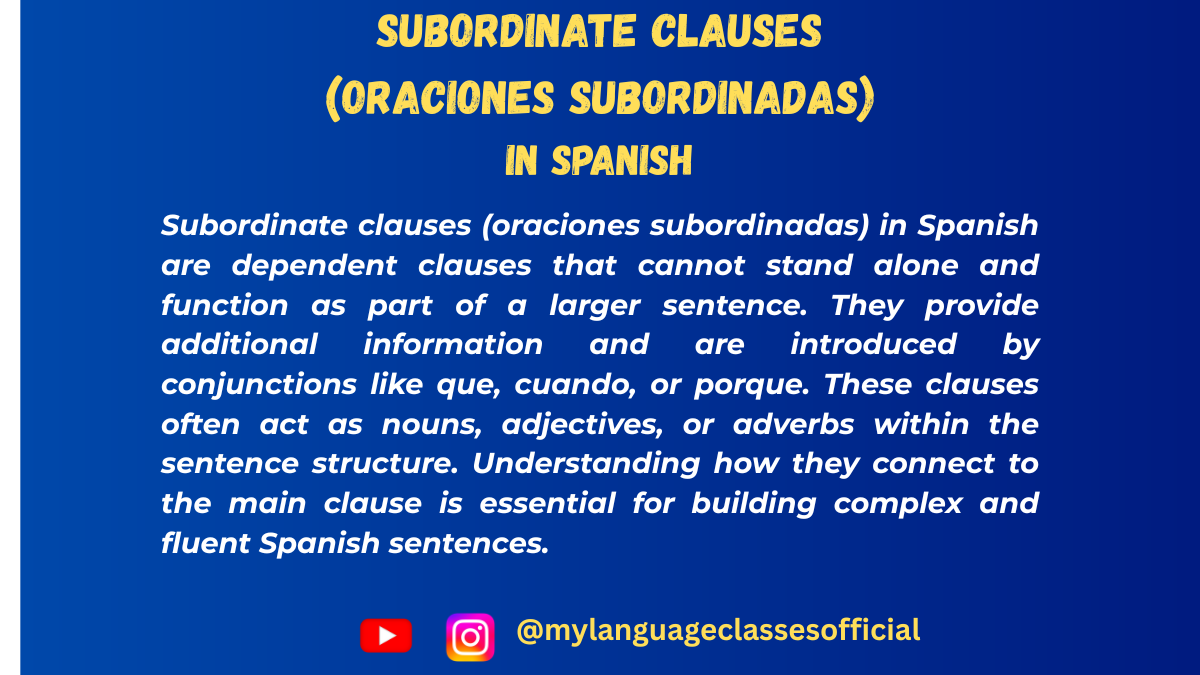
Subordinate Clauses (Oraciones Subordinadas) in Spanish
Subordinate clauses, or oraciones subordinadas in Spanish, are an essential part of mastering the language. They allow you to express complex ideas by connecting a main clause with a dependent clause. In simpler terms, a subordinate clause cannot stand alone as a complete sentence; it relies on the main clause to give it meaning. Whether you’re describing a condition, providing a reason, or expressing time, subordinate clauses are your go-to tool for adding depth and nuance to your Spanish conversations and writing.
In this blog post, we’ll explore everything you need to know about subordinate clauses in Spanish, including common expressions, conjugation rules, irregular verbs, and practical examples. By the end, you’ll be able to use subordinate clauses confidently in your daily Spanish communication.
Common Expressions Using Subordinate Clauses
Subordinate clauses are often introduced by specific conjunctions or expressions. Here’s a list of common ones used in everyday Spanish:
- Porque (because)
- Example: Estudio porque quiero aprender. (I study because I want to learn.)
- Aunque (although, even though)
- Example: Voy al parque aunque llueva. (I’m going to the park even if it rains.)
- Si (if)
- Example: Si tengo tiempo, te llamaré. (If I have time, I’ll call you.)
- Cuando (when)
- Example: Cuando llegues, avísame. (When you arrive, let me know.)
- Mientras (while)
- Example: Mientras cocino, escucho música. (While I cook, I listen to music.)
- Como (since, as)
- Example: Como no estudiaste, reprobaste. (Since you didn’t study, you failed.)
- Para que (so that)
- Example: Estudio mucho para que pueda aprobar. (I study a lot so that I can pass.)
- A menos que (unless)
- Example: No iré a menos que tú vayas. (I won’t go unless you go.)
- Después de que (after)
- Example: Después de que termines, llámame. (After you finish, call me.)
- Antes de que (before)
- Example: Llegaré antes de que empiece la película. (I’ll arrive before the movie starts.)
Things to Keep in Mind
When using subordinate clauses in Spanish, there are a few key points to remember:
- Verb Conjugation: The verb in the subordinate clause must agree with the subject and tense of the main clause.
- Example: Si tengo dinero, viajaré. (If I have money, I will travel.)
- Subjunctive Mood: Some subordinate clauses require the subjunctive mood, especially when expressing doubt, uncertainty, or hypothetical situations.
- Example: Espero que vengas. (I hope you come.)
- Articles and Gender: Ensure that articles and adjectives agree in gender and number with the nouns they modify.
- Example: El libro que compré es interesante. (The book that I bought is interesting.)
- Plural Forms: Pay attention to plural forms when using subordinate clauses.
- Example: Los niños que juegan son felices. (The children who play are happy.)
- Punctuation: In Spanish, subordinate clauses are often separated by commas when they precede the main clause.
- Example: Cuando llegues, avísame. (When you arrive, let me know.)
When to Use Subordinate Clauses
Subordinate clauses are used in various situations, including:
- Expressing Cause or Reason:
- No fui a la fiesta porque estaba cansado. (I didn’t go to the party because I was tired.)
- Describing Conditions:
- Si estudias, aprobarás. (If you study, you’ll pass.)
- Indicating Time:
- Cuando termine, te llamaré. (When I finish, I’ll call you.)
- Expressing Purpose:
- Estudio para que pueda conseguir un buen trabajo. (I study so that I can get a good job.)
- Showing Contrast:
- Aunque hace frío, voy a salir. (Even though it’s cold, I’m going out.)
Conjugation
Regular Verbs
Subordinate clauses can be formed with regular verbs in Spanish. Here’s how to conjugate them in the present tense:
- -AR Verbs (e.g., hablar)
- Yo hablo
- Tú hablas
- Él/Ella/Usted habla
- Nosotros hablamos
- Vosotros habláis
- Ellos/Ellas/Ustedes hablan
- -ER Verbs (e.g., comer)
- Yo como
- Tú comes
- Él/Ella/Usted come
- Nosotros comemos
- Vosotros coméis
- Ellos/Ellas/Ustedes comen
- -IR Verbs (e.g., vivir)
- Yo vivo
- Tú vives
- Él/Ella/Usted vive
- Nosotros vivimos
- Vosotros vivís
- Ellos/Ellas/Ustedes viven
Irregular Verbs
Irregular verbs in subordinate clauses follow unique conjugation patterns. Here are some common irregular verbs and their conjugations:
- Ser (to be)
- Yo soy
- Tú eres
- Él/Ella/Usted es
- Nosotros somos
- Vosotros sois
- Ellos/Ellas/Ustedes son
- Ir (to go)
- Yo voy
- Tú vas
- Él/Ella/Usted va
- Nosotros vamos
- Vosotros vais
- Ellos/Ellas/Ustedes van
- Tener (to have)
- Yo tengo
- Tú tienes
- Él/Ella/Usted tiene
- Nosotros tenemos
- Vosotros tenéis
- Ellos/Ellas/Ustedes tienen
Regular Verbs in Subordinate Clauses: Examples
Verb Example Sentence 1 Meaning Example Sentence 2 Meaning Hablar Espero que hables con él. I hope you talk to him. Cuando hables, sé claro. When you speak, be clear. Comer Quiero que comas sano. I want you to eat healthy. Si comes mucho, te sentirás mal. If you eat too much, you’ll feel sick. Vivir Espero que vivas feliz. I hope you live happily. Cuando vivas aquí, lo entenderás. When you live here, you’ll understand. Estudiar A menos que estudies, no aprobarás. Unless you study, you won’t pass. Estudio para que pueda aprender. I study so that I can learn. Trabajar Cuando trabajes, sé responsable. When you work, be responsible. Trabajo para que mi familia tenga todo. I work so that my family has everything. Escribir Espero que escribas una carta. I hope you write a letter. Si escribes bien, te publicarán. If you write well, they’ll publish you. Leer Quiero que leas este libro. I want you to read this book. Cuando leas, comprenderás. When you read, you’ll understand. Correr A menos que corras, no llegarás. Unless you run, you won’t arrive. Corro para que pueda mantenerme en forma. I run so that I can stay in shape. Bailar Espero que bailes conmigo. I hope you dance with me. Si bailas bien, te felicitarán. If you dance well, they’ll congratulate you. Cantar Quiero que cantes en la fiesta. I want you to sing at the party. Cuando cantes, todos te escucharán. When you sing, everyone will listen to you.
More Example Sentences
- Espero que vengas a la reunión. (I hope you come to the meeting.)
- Si llueve, no iremos al parque. (If it rains, we won’t go to the park.)
- Aunque esté cansado, terminaré el trabajo. (Even though I’m tired, I’ll finish the work.)
- Cuando llegues, avísame. (When you arrive, let me know.)
- Estudio mucho para que pueda aprobar. (I study a lot so that I can pass.)
- No iré a menos que tú vayas. (I won’t go unless you go.)
- Después de que termines, llámame. (After you finish, call me.)
- Llegaré antes de que empiece la película. (I’ll arrive before the movie starts.)
- Como no estudiaste, reprobaste. (Since you didn’t study, you failed.)
- Mientras cocino, escucho música. (While I cook, I listen to music.)
Fill in the Blanks
- Espero que _______ (venir) a la fiesta.
- Si _______ (tener) tiempo, te ayudaré.
- Aunque _______ (estar) cansado, iré.
- Cuando _______ (llegar), avísame.
- Estudio para que _______ (poder) aprobar.
- No iré a menos que tú _______ (ir).
- Después de que _______ (terminar), llámame.
- Llegaré antes de que _______ (empezar) la película.
- Como no _______ (estudiar), reprobaste.
- Mientras _______ (cocinar), escucho música.
Answers:
- vengas
- tienes
- esté
- llegues
- pueda
- vayas
- termines
- empiece
- estudiaste
- cocino
Conclusion
Mastering subordinate clauses in Spanish opens up a world of possibilities for expressing complex ideas and emotions. By understanding the rules of conjugation, recognizing common expressions, and practicing regularly, you’ll soon find yourself using oraciones subordinadas with ease. Whether you’re writing, speaking, or simply trying to understand native speakers, this guide will help you navigate the intricacies of Spanish grammar.
¡Buena suerte! (Good luck!)
If you enjoyed this lesson, be sure to check out more posts like this on my blog at My Language Classes. Don’t forget to subscribe my YouTube channel and follow me on Instagram for the latest language learning tips and lessons. Leave a comment below to share your thoughts, or ask any questions you have about nouns.
Happy learning! 😊
- 100 Spanish Example Sentences
- 100 Spanish Fill-in-the-Blanks Exercises
- 100 Spanish Vocabulary Lists
- Spanish – Advanced
- Spanish – Beginner
- Spanish – Intermediate
- Porque (because)
-
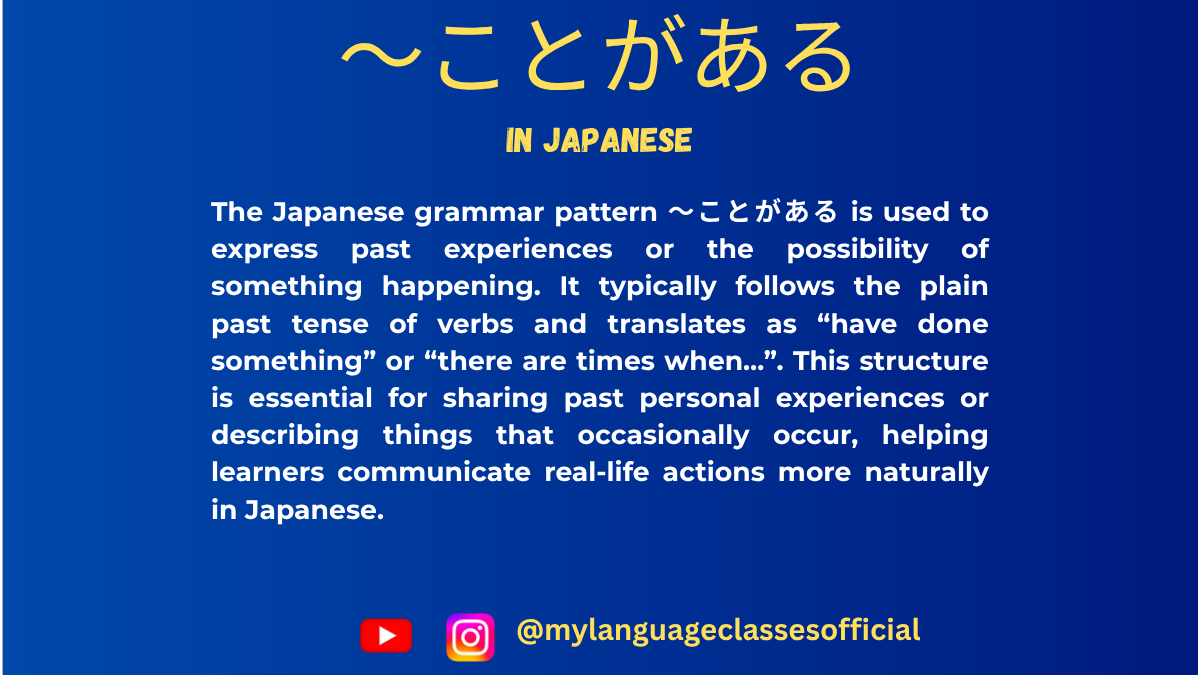
Understanding 〜ことがある in Japanese | My Language Classes
Understanding 〜ことがある
In Japanese, the phrase 〜ことがある (koto ga aru) is a versatile and commonly used expression that allows speakers to talk about past experiences or situations that have occurred at least once. It translates roughly to “have done something” or “there are times when…” in English. This structure is essential for anyone looking to express experiences, habits, or occasional events in Japanese. Whether you’re a beginner or an advanced learner, mastering 〜ことがある will significantly enhance your conversational and writing skills.
In this blog post, we’ll break down the formation, usage, and nuances of 〜ことがある. We’ll also provide plenty of examples and practice questions to help you get comfortable with this grammar point.
Formation of 〜ことがある
The formation of 〜ことがある depends on the type of word it follows: verbs, nouns, or adjectives. Let’s explore each one.
1. With Verbs
When used with verbs, 〜ことがある follows the past tense (ta-form) of the verb. This structure is used to express that someone has experienced something at least once in their life.
- Formation: Verb (た-form) + ことがある
Example:
食べる (taberu) → 食べた (tabeta) → 食べたことがある (tabeta koto ga aru)
Meaning: “I have eaten (it) before.”
2. With Nouns
When used with nouns, 〜ことがある is paired with the particle の to indicate that something has happened or exists.
- Formation: Noun + の + ことがある
Example:
旅行 (ryokou) → 旅行のことがある (ryokou no koto ga aru)
Meaning: “There are times when I travel.”
3. With Adjectives
When used with adjectives, 〜ことがある follows the adjective in its plain form. This structure is used to describe situations or feelings that have occurred.
- Formation:
- い-adjectives: い-adjective + ことがある
Example:
楽しい (tanoshii) → 楽しいことがある (tanoshii koto ga aru)
Meaning: “There are times when it’s fun.” - な-adjectives: な-adjective + な + ことがある
Example:
静か (shizuka) → 静かなことがある (shizuka na koto ga aru)
Meaning: “There are times when it’s quiet.”
- い-adjectives: い-adjective + ことがある
Usage of 〜ことがある
The 〜ことがある form is used in various situations to express experiences, habits, or occasional events. Here are some common scenarios:
- Talking about past experiences:
- 日本に行ったことがある。
(Nihon ni itta koto ga aru.)
“I have been to Japan before.”
- 日本に行ったことがある。
- Describing occasional events:
- 雨が降ることがある。
(Ame ga furu koto ga aru.)
“It sometimes rains.”
- 雨が降ることがある。
- Expressing habits or tendencies:
- 夜遅くまで起きていることがある。
(Yoru osoku made okite iru koto ga aru.)
“There are times when I stay up late at night.”
- 夜遅くまで起きていることがある。
- Talking about rare occurrences:
- 彼が怒ることがある。
(Kare ga okoru koto ga aru.)
“He sometimes gets angry.”
- 彼が怒ることがある。
- Describing feelings or emotions:
- 寂しいことがある。
(Sabishii koto ga aru.)
“There are times when I feel lonely.”
- 寂しいことがある。
List of Verbs, Nouns, and Adjectives with 〜ことがある
Here’s a table with examples of verbs, nouns, and adjectives used with 〜ことがある:
Type Word 〜ことがある Form Example Sentence (Romaji) Meaning in English Verb 見る (miru) 見たことがある (mita koto ga aru) その映画を見たことがある。 (Sono eiga o mita koto ga aru.) “I have seen that movie before.” 行く (iku) 行ったことがある (itta koto ga aru) 京都に行ったことがある。 (Kyoto ni itta koto ga aru.) “I have been to Kyoto before.” Noun 夢 (yume) 夢のことがある (yume no koto ga aru) 怖い夢のことがある。 (Kowai yume no koto ga aru.) “There are times when I have scary dreams.” 事故 (jiko) 事故のことがある (jiko no koto ga aru) 大きな事故のことがある。 (Ookina jiko no koto ga aru.) “There are times when big accidents happen.” い-Adj 暑い (atsui) 暑いことがある (atsui koto ga aru) 夏は暑いことがある。 (Natsu wa atsui koto ga aru.) “There are times when it’s hot in summer.” 寒い (samui) 寒いことがある (samui koto ga aru) 冬は寒いことがある。 (Fuyu wa samui koto ga aru.) “There are times when it’s cold in winter.” な-Adj 便利 (benri) 便利なことがある (benri na koto ga aru) このアプリは便利なことがある。 (Kono apuri wa benri na koto ga aru.) “There are times when this app is convenient.” 危険 (kiken) 危険なことがある (kiken na koto ga aru) 山登りは危険なことがある。 (Yamanobori wa kiken na koto ga aru.) “There are times when mountain climbing is dangerous.”
More Example Sentences
Here are 10 additional example sentences using 〜ことがある:
- 彼女と話したことがある。
(Kanojo to hanashita koto ga aru.)
“I have talked to her before.” - このレストランで食事をしたことがある。
(Kono resutoran de shokuji o shita koto ga aru.)
“I have eaten at this restaurant before.” - 雪が降ることがある。
(Yuki ga furu koto ga aru.)
“It sometimes snows.” - 彼は遅刻することがある。
(Kare wa chikoku suru koto ga aru.)
“He is sometimes late.” - この本を読んだことがある。
(Kono hon o yonda koto ga aru.)
“I have read this book before.” - 旅行中に迷子になったことがある。
(Ryokou-chuu ni maigo ni natta koto ga aru.)
“I have gotten lost during a trip before.” - この歌を聞いたことがある。
(Kono uta o kiita koto ga aru.)
“I have heard this song before.” - 彼女は泣くことがある。
(Kanojo wa naku koto ga aru.)
“She sometimes cries.” - この道を通ったことがある。
(Kono michi o tootta koto ga aru.)
“I have taken this road before.” - 試験に失敗したことがある。
(Shiken ni shippai shita koto ga aru.)
“I have failed an exam before.”
Things to Keep in Mind
- Tense: 〜ことがある is always used in the present tense, even when referring to past experiences.
Example: 日本に行ったことがある。 (Not 行ったことがあった。) - Negation: To say “I have never done something,” use 〜ことがない.
Example: 日本に行ったことがない。 (Nihon ni itta koto ga nai.)
“I have never been to Japan.” - Frequency: 〜ことがある implies that the event or experience is occasional, not regular.
- Politeness: In formal situations, use 〜ことがあります instead of 〜ことがある.
Fill in the Blanks
Verbs
- 彼は______がある。(怒る)
Answer: 彼は怒ることがある。
(Kare wa okoru koto ga aru.)
“He sometimes gets angry.” - この映画を______がある。(見る)
Answer: この映画を見たことがある。
(Kono eiga o mita koto ga aru.)
“I have seen this movie before.” - 雨が______がある。(降る)
Answer: 雨が降ることがある。
(Ame ga furu koto ga aru.)
“It sometimes rains.” - 彼女と______がある。(話す)
Answer: 彼女と話したことがある。
(Kanojo to hanashita koto ga aru.)
“I have talked to her before.” - この本を______がある。(読む)
Answer: この本を読んだことがある。
(Kono hon o yonda koto ga aru.)
“I have read this book before.”
Nouns
- 旅行中に迷子に______がある。(なる)
Answer: 旅行中に迷子になったことがある。
(Ryokou-chuu ni maigo ni natta koto ga aru.)
“I have gotten lost during a trip before.” - この歌を______がある。(聞く)
Answer: この歌を聞いたことがある。
(Kono uta o kiita koto ga aru.)
“I have heard this song before.”
Adjectives
- 彼女は______がある。(泣く)
Answer: 彼女は泣くことがある。
(Kanojo wa naku koto ga aru.)
“She sometimes cries.” - この道を______がある。(通る)
Answer: この道を通ったことがある。
(Kono michi o tootta koto ga aru.)
“I have taken this road before.” - 試験に______がある。(失敗)
Answer: 試験に失敗したことがある。
(Shiken ni shippai shita koto ga aru.)
“I have failed an exam before.”
Conclusion
Mastering 〜ことがある is a key step in becoming fluent in Japanese. It allows you to express experiences, habits, and occasional events with ease. By understanding its formation and usage, you’ll be able to communicate more effectively and naturally. Practice the examples and fill-in-the-blank questions provided in this blog, and soon you’ll be using 〜ことがある like a pro!
If you enjoyed this lesson, be sure to check out more posts like this on my blog at My Language Classes. Don’t forget to subscribe my YouTube channel and follow me on Instagram for the latest language learning tips and lessons. Leave a comment below to share your thoughts, or ask any questions you have about nouns.
Happy learning! 😊
- Formation: Verb (た-form) + ことがある
-
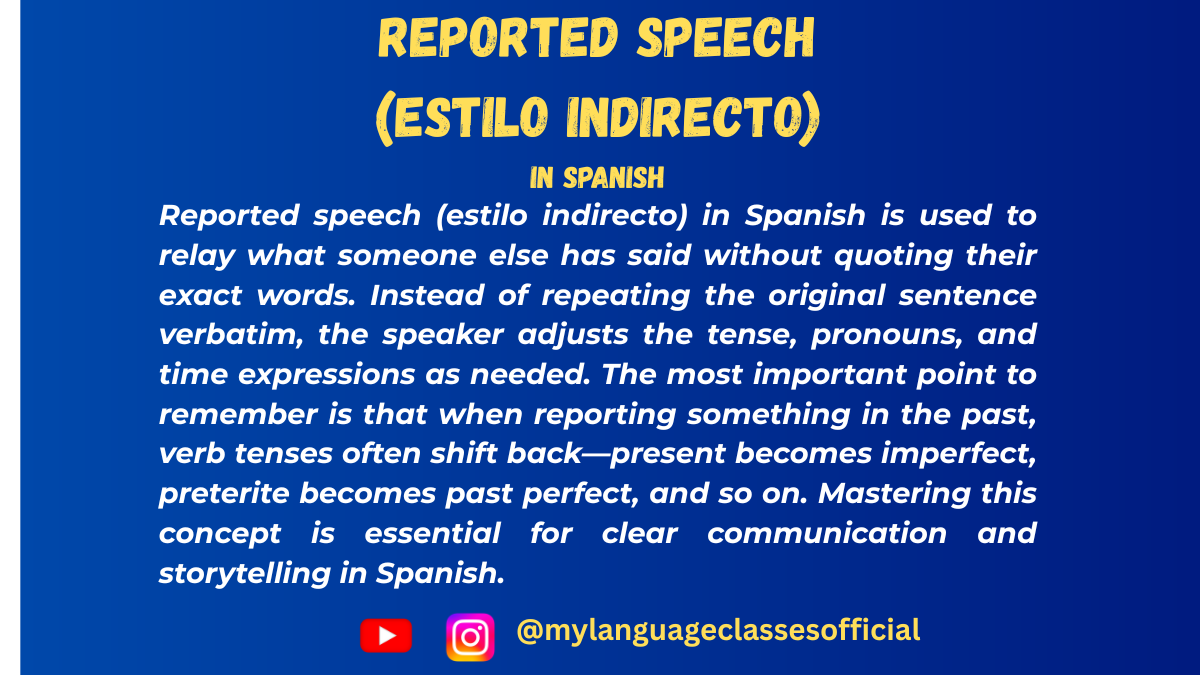
Reported Speech (Estilo Indirecto) in Spanish
Reported speech, or estilo indirecto, is a fundamental aspect of Spanish grammar that allows us to relay what someone else has said without quoting their exact words. It is used in both formal and informal contexts, making it an essential skill for effective communication in Spanish. Whether you’re recounting a conversation, sharing news, or summarizing someone’s thoughts, mastering estilo indirecto will significantly enhance your fluency.
In this blog post, we’ll explore everything you need to know about estilo indirecto, including common expressions, conjugation rules, irregular verbs, and practical examples. By the end, you’ll have a solid understanding of how to use reported speech confidently in Spanish.
Common Expressions Using Estilo Indirecto
Here’s a list of common expressions used in daily life with estilo indirecto. These phrases are frequently used to report speech or thoughts:
- Dijo que… – He/She said that…
- Me preguntó si… – He/She asked me if…
- Quería saber si… – He/She wanted to know if…
- Explicó que… – He/She explained that…
- Comentó que… – He/She commented that…
- Aseguró que… – He/She assured that…
- Negó que… – He/She denied that…
- Prometió que… – He/She promised that…
- Sugirió que… – He/She suggested that…
- Advirtió que… – He/She warned that…
These expressions are often followed by a verb in the indicative or subjunctive mood, depending on the context.
Things to Keep in Mind
When using estilo indirecto, there are several key points to remember:
- Verb Tense Changes: The tense of the verb in the original statement often changes in reported speech. For example, present tense may shift to imperfect, and preterite may shift to pluperfect.
- Pronoun Adjustments: Pronouns often change to reflect the new perspective. For example, yo (I) may become él/ella (he/she).
- Time and Place References: Words like hoy (today) may change to aquel día (that day) in reported speech.
- Use of Que: The word que (that) is frequently used to introduce reported speech.
- Subjunctive Mood: If the original statement expresses doubt, uncertainty, or a recommendation, the subjunctive mood is used in estilo indirecto.
- Gender and Number Agreement: Ensure that adjectives and articles agree in gender and number with the nouns they modify.
When to Use Estilo Indirecto
Estilo indirecto is used in the following situations:
- Reporting Statements: To relay what someone has said.
- Example: Juan dijo que tenía hambre. (Juan said he was hungry.)
- Reporting Questions: To report questions asked by someone.
- Example: Me preguntó si quería café. (He asked me if I wanted coffee.)
- Reporting Commands or Requests: To relay instructions or requests.
- Example: Ella me pidió que cerrara la puerta. (She asked me to close the door.)
- Reporting Thoughts or Feelings: To share someone’s thoughts or emotions.
- Example: Pensé que no vendrías. (I thought you wouldn’t come.)
Conjugation
Regular Verbs
In estilo indirecto, regular verbs follow the same conjugation rules as in direct speech. However, the tense may change depending on the context. Here’s how to conjugate regular verbs in the three main categories:
- -AR Verbs (e.g., hablar)
- Present: habla → Imperfect: hablaba
- Preterite: habló → Pluperfect: había hablado
- -ER Verbs (e.g., comer)
- Present: come → Imperfect: comía
- Preterite: comió → Pluperfect: había comido
- -IR Verbs (e.g., vivir)
- Present: vive → Imperfect: vivía
- Preterite: vivió → Pluperfect: había vivido
Irregular Verbs
Irregular verbs in estilo indirecto follow the same conjugation patterns as in direct speech, but their forms must be memorized. Here are some common irregular verbs and their conjugations:
- Ser (to be)
- Present: es → Imperfect: era
- Preterite: fue → Pluperfect: había sido
- Ir (to go)
- Present: va → Imperfect: iba
- Preterite: fue → Pluperfect: había ido
- Decir (to say)
- Present: dice → Imperfect: decía
- Preterite: dijo → Pluperfect: había dicho
- Hacer (to do/make)
- Present: hace → Imperfect: hacía
- Preterite: hizo → Pluperfect: había hecho
- Tener (to have)
- Present: tiene → Imperfect: tenía
- Preterite: tuvo → Pluperfect: había tenido
List of common Verbs in Estilo Indirecto
Verb Estilo Indirecto Form Example Sentence 1 Example Sentence 2 Meaning Hablar hablaba Dijo que hablaba con su madre. Ella comentó que hablaba español. He said he was talking to his mom. / She mentioned she spoke Spanish. Comer comía Me dijo que comía pizza. Ellos aseguraron que comían saludable. He told me he was eating pizza. / They assured they ate healthy. Vivir vivía Explicó que vivía en Madrid. Pensé que vivías cerca. He explained he lived in Madrid. / I thought you lived nearby. Ser era Dijo que era médico. Creí que era tarde. He said he was a doctor. / I thought it was late. Ir iba Me preguntó si iba al cine. Ella dijo que iba a llamarte. He asked me if I was going to the cinema. / She said she was going to call you. Decir dijo Juan dijo que no vendría. Ellos dijeron que tenían prisa. Juan said he wouldn’t come. / They said they were in a hurry. Hacer hizo Aseguró que hizo la tarea. Pensé que hacías ejercicio. He assured he did the homework. / I thought you were exercising. Tener tenía Me dijo que tenía sueño. Creí que tenías razón. He told me he was sleepy. / I thought you were right. Poder podía Dijo que podía ayudarme. Ellos comentaron que podían venir. He said he could help me. / They mentioned they could come. Querer quería Me preguntó si quería café. Ella dijo que quería viajar. He asked me if I wanted coffee. / She said she wanted to travel.
More Example Sentences
- Dijo que no podía venir a la fiesta. (He said he couldn’t come to the party.)
- Me preguntó si había terminado el proyecto. (He asked me if I had finished the project.)
- Ella aseguró que sabía la respuesta. (She assured she knew the answer.)
- Explicó que no tenía tiempo. (He explained he didn’t have time.)
- Comentó que le gustaba el café. (He mentioned he liked coffee.)
- Advirtió que llovería mañana. (He warned it would rain tomorrow.)
- Prometió que llamaría más tarde. (He promised he would call later.)
- Negó que hubiera robado el dinero. (He denied he had stolen the money.)
- Sugirió que fuéramos al parque. (He suggested we go to the park.)
- Quería saber si habías visto la película. (He wanted to know if you had seen the movie.)
Fill in the Blanks
- Ella _____ que no _____ tiempo. (decir, tener)
- Me _____ si _____ al cine. (preguntar, ir)
- Dijo que _____ la tarea. (hacer)
- Nos _____ que _____ temprano. (pedir, llegar)
- Creí que _____ en casa. (estar)
- Explicó que no _____ la respuesta. (saber)
- Ellos _____ que _____ a la fiesta. (decir, venir)
- Pensé que _____ más tarde. (llamar)
- Aseguró que _____ el libro. (leer)
- Me _____ si _____ ayuda. (preguntar, necesitar)
Answers:
- dijo, tenía
- preguntó, iba
- había hecho
- pidió, llegáramos
- estabas
- sabía
- dijeron, vendrían
- llamarías
- había leído
- preguntó, necesitaba
Conclusion
Mastering estilo indirecto is a crucial step toward achieving fluency in Spanish. By understanding the rules of conjugation, recognizing common expressions, and practicing with real-life examples, you’ll be able to report speech accurately and naturally. Remember to pay attention to verb tense changes, pronoun adjustments, and the use of the subjunctive mood when necessary. With consistent practice, you’ll soon find yourself using estilo indirecto with confidence in everyday conversations.
¡Buena suerte! (Good luck!)
If you enjoyed this lesson, be sure to check out more posts like this on my blog at My Language Classes. Don’t forget to subscribe my YouTube channel and follow me on Instagram for the latest language learning tips and lessons. Leave a comment below to share your thoughts, or ask any questions you have about nouns.
Happy learning! 😊
- 100 Spanish Example Sentences
- 100 Spanish Fill-in-the-Blanks Exercises
- 100 Spanish Vocabulary Lists
- Spanish – Advanced
- Spanish – Beginner
- Spanish – Intermediate
-
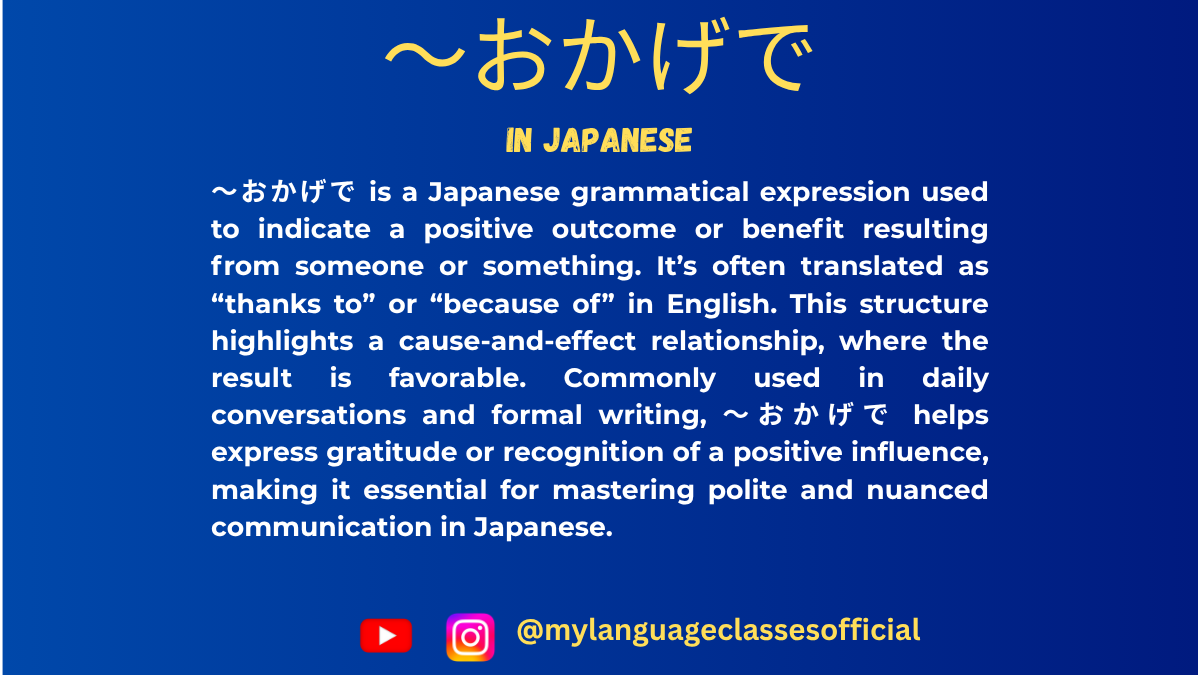
Understanding 〜おかげで in Japanese | My Language Classes
Understanding 〜おかげで
In Japanese, 〜おかげで (okage de) is a grammar point used to express gratitude or acknowledgment for a positive outcome that resulted from someone’s help, effort, or a specific situation. It translates to “thanks to,” “because of,” or “due to” in English. While it is often used in positive contexts, it can also be used sarcastically to imply a negative outcome. Understanding how to use 〜おかげで correctly is essential for expressing cause and effect in Japanese, especially when giving credit or showing appreciation.
Formation of 〜おかげで
The 〜おかげで structure can be formed with verbs, nouns, and adjectives. Here’s how it works:
1. With Verbs
- Verb (plain past tense) + おかげで
Example:
勉強したおかげで (benkyou shita okage de) – Thanks to studying
2. With Nouns
- Noun + の + おかげで
Example:
先生のおかげで (sensei no okage de) – Thanks to the teacher
3. With Adjectives
- い-Adjective (plain past tense) + おかげで
Example:
楽しかったおかげで (tanoshikatta okage de) – Thanks to it being fun - な-Adjective + だった + おかげで
Example:
静かだったおかげで (shizuka datta okage de) – Thanks to it being quiet
Usage of 〜おかげで
〜おかげで is used in various situations to express gratitude or acknowledge the cause of a positive outcome. Here are some common scenarios:
- Expressing Gratitude: Thanking someone for their help or effort.
Example: あなたのおかげで成功しました。 (Anata no okage de seikou shimashita.) – Thanks to you, I succeeded. - Acknowledging a Situation: Recognizing a situation that led to a positive result.
Example: いい天気のおかげでピクニックが楽しめました。 (Ii tenki no okage de pikunikku ga tanoshimemashita.) – Thanks to the good weather, we enjoyed the picnic. - Sarcastic Usage: Implying a negative outcome (often used humorously or ironically).
Example: あなたのおかげで遅刻しました。 (Anata no okage de chikoku shimashita.) – Thanks to you, I was late.
List of Verbs, Nouns, and Adjectives with 〜おかげで Form
Word Type Word 〜おかげで Form Example Sentence (Japanese) Romaji Version English Meaning Verb 勉強する (study) 勉強したおかげで 勉強したおかげで合格した。 Benkyou shita okage de goukaku shita. Thanks to studying, I passed the exam. Verb 頑張る (work hard) 頑張ったおかげで 頑張ったおかげで成功した。 Ganbatta okage de seikou shita. Thanks to working hard, I succeeded. Noun 先生 (teacher) 先生のおかげで 先生のおかげで日本語が上手になった。 Sensei no okage de nihongo ga jouzu ni natta. Thanks to the teacher, my Japanese improved. Noun 友達 (friend) 友達のおかげで 友達のおかげで楽しかった。 Tomodachi no okage de tanoshikatta. Thanks to my friend, it was fun. い-Adjective 楽しい (fun) 楽しかったおかげで 楽しかったおかげで元気になった。 Tanoshikatta okage de genki ni natta. Thanks to it being fun, I felt energized. い-Adjective 早い (early) 早かったおかげで 早かったおかげで間に合った。 Hayakatta okage de maniatta. Thanks to being early, I made it on time. な-Adjective 静か (quiet) 静かだったおかげで 静かだったおかげで集中できた。 Shizuka datta okage de shuuchuu dekita. Thanks to it being quiet, I could focus. な-Adjective 便利 (convenient) 便利だったおかげで 便利だったおかげで時間が節約できた。 Benri datta okage de jikan ga setsuyaku dekita. Thanks to it being convenient, I saved time.
More Example Sentences
- 友達のおかげで新しい仕事を見つけました。
Tomodachi no okage de atarashii shigoto o mitsukemashita.
Thanks to my friend, I found a new job. - 雨のおかげで庭の花がきれいに咲きました。
Ame no okage de niwa no hana ga kirei ni sakimashita.
Thanks to the rain, the flowers in the garden bloomed beautifully. - 彼のアドバイスのおかげで問題が解決しました。
Kare no adobaisu no okage de mondai ga kaiketsu shimashita.
Thanks to his advice, the problem was solved. - 勉強したおかげで試験に合格しました。
Benkyou shita okage de shiken ni goukaku shimashita.
Thanks to studying, I passed the exam. - 先生のおかげで日本語が上手になりました。
Sensei no okage de nihongo ga jouzu ni narimashita.
Thanks to the teacher, my Japanese improved. - 早く起きたおかげで朝ごはんを食べられました。
Hayaku okita okage de asagohan o taberaremashita.
Thanks to waking up early, I could eat breakfast. - 彼女のおかげで楽しい時間を過ごせました。
Kanojo no okage de tanoshii jikan o sugosemashita.
Thanks to her, I had a great time. - 天気が良かったおかげで遠足が楽しめました。
Tenki ga yokatta okage de ensoku ga tanoshimemashita.
Thanks to the good weather, the field trip was enjoyable. - あなたのおかげで自信がつきました。
Anata no okage de jishin ga tsukimashita.
Thanks to you, I gained confidence. - 便利なアプリのおかげで道に迷いませんでした。
Benri na apuri no okage de michi ni mayoimasen deshita.
Thanks to the convenient app, I didn’t get lost.
Things to Keep in Mind
- Positive vs. Sarcastic Usage: While 〜おかげで is mostly used for positive outcomes, it can also be used sarcastically. Pay attention to the context.
- Politeness: When expressing gratitude, 〜おかげで is polite enough for most situations. However, adding です or ます forms can make it more formal.
- Avoid Overuse: Use 〜おかげで when the cause and effect are clear. Overusing it can make your speech sound unnatural.
- Subject Awareness: The subject of the sentence is often omitted in Japanese, so ensure the context makes it clear who or what is being thanked.
Fill in the Blanks
- 彼の助けのおかげで、__________。
- 勉強したおかげで、__________。
- 先生のおかげで、__________。
- 天気が良かったおかげで、__________。
- 友達のおかげで、__________。
- 早く起きたおかげで、__________。
- 便利なアプリのおかげで、__________。
- 静かだったおかげで、__________。
- 彼女のおかげで、__________。
- 頑張ったおかげで、__________。
Answers:
- 彼の助けのおかげで、問題が解決しました。
- 勉強したおかげで、試験に合格しました。
- 先生のおかげで、日本語が上手になりました。
- 天気が良かったおかげで、遠足が楽しめました。
- 友達のおかげで、楽しい時間を過ごせました。
- 早く起きたおかげで、朝ごはんを食べられました。
- 便利なアプリのおかげで、道に迷いませんでした。
- 静かだったおかげで、集中できました。
- 彼女のおかげで、自信がつきました。
- 頑張ったおかげで、成功しました。
Conclusion
〜おかげで is a versatile and essential grammar point in Japanese that allows you to express gratitude, acknowledge positive outcomes, or even add a touch of sarcasm. By mastering its formation and usage, you can effectively communicate cause-and-effect relationships in various contexts. Practice using 〜おかげで in your daily conversations, and soon it will become a natural part of your Japanese language skills. Keep studying, and 頑張ってください! (Ganbatte kudasai!)
If you enjoyed this lesson, be sure to check out more posts like this on my blog at My Language Classes. Don’t forget to subscribe my YouTube channel and follow me on Instagram for the latest language learning tips and lessons. Leave a comment below to share your thoughts, or ask any questions you have about nouns.
Happy learning! 😊
- Verb (plain past tense) + おかげで
-

How to Stay Consistent and Avoid Burnout in Language Learning | My Language Classes
How to Stay Consistent in Language Learning
Learning a new language is an exciting journey, but it’s not without its challenges. Whether you’re a beginner or an advanced learner, staying consistent and avoiding burnout can feel like an uphill battle. You might start with enthusiasm, only to find yourself losing steam after a few weeks. Sound familiar? You’re not alone.
In this blog post, we’ll explore practical strategies to help you stay consistent in your language learning journey while avoiding burnout. From setting realistic goals to incorporating fun into your routine, we’ve got you covered. Let’s dive in!
Why Consistency Matters in Language Learning
Consistency is the backbone of language learning. Unlike cramming, which might help you pass a test, consistent practice helps you internalize the language, build fluency, and retain what you’ve learned. However, maintaining consistency requires more than just willpower—it requires a well-thought-out plan.
Section 1: Setting Realistic Goals
1.1 Start Small and Build Momentum
One of the biggest mistakes language learners make is setting overly ambitious goals. Instead of aiming to master a language in three months, break your goals into smaller, achievable milestones. For example, focus on learning 10 new words a day or holding a 5-minute conversation by the end of the week.
Pro Tip: Use the SMART goal framework—Specific, Measurable, Achievable, Relevant, and Time-bound—to structure your language learning objectives.
1.2 Track Your Progress
Tracking your progress not only keeps you motivated but also helps you identify areas for improvement. Use a journal, app, or spreadsheet to log your daily or weekly achievements.
Actionable Advice: Celebrate small wins! Finished a chapter in your textbook? Reward yourself with a treat or a break.
Section 2: Creating a Sustainable Routine
2.1 Find Your Optimal Learning Time
Are you a morning person or a night owl? Identify the time of day when you’re most alert and focused, and dedicate that time to language learning.
Expert Insight: Studies show that short, frequent study sessions are more effective than long, infrequent ones. Aim for 20-30 minutes daily rather than a 3-hour marathon session once a week.
2.2 Mix Up Your Learning Methods
Repetition is key, but monotony can lead to burnout. Combine different learning methods like reading, listening, speaking, and writing. Use flashcards, language apps, podcasts, and videos to keep things fresh.
Practical Tip: Incorporate language learning into your daily life. Label household items in your target language, or listen to a podcast while commuting.
Section 3: Staying Motivated
3.1 Connect with a Community
Language learning doesn’t have to be a solo journey. Join online forums, language exchange groups, or social media communities to connect with fellow learners.
Call to Action: Follow My Language Classes on Instagram and join our vibrant community of language enthusiasts!
3.2 Find Your “Why”
Remind yourself why you started learning the language in the first place. Is it to travel, connect with family, or advance your career? Keeping your “why” front and center can reignite your motivation during tough times.
Personal Anecdote: When I first started learning Spanish, I hit a plateau and felt like giving up. But remembering my dream of traveling through South America kept me going—and now I’m fluent!
Section 4: Avoiding Burnout
4.1 Listen to Your Body and Mind
Burnout often stems from pushing yourself too hard. If you’re feeling exhausted or frustrated, take a break. It’s okay to step back and recharge.
Expert Advice: Incorporate mindfulness practices like meditation or deep breathing to reduce stress and improve focus.
4.2 Make Learning Fun
Turn language learning into a hobby rather than a chore. Watch movies, listen to music, or play games in your target language.
Pro Tip: Check out My Language Classes on YouTube for fun and engaging language learning videos!
Section 5: Overcoming Common Challenges
5.1 Dealing with Plateaus
Plateaus are a natural part of the learning process. When progress feels slow, revisit your goals, try new methods, or seek feedback from a tutor or native speaker.
Actionable Advice: Join My Language Classes on Quora to ask questions and get expert advice from our community.
5.2 Managing Time Effectively
Balancing language learning with other responsibilities can be tough. Use time-blocking techniques to allocate specific slots for learning in your schedule.
Practical Tip: Use apps like Trello or Notion to organize your language learning tasks and stay on track.
Conclusion: Consistency is Key
Staying consistent in language learning is about finding a balance between discipline and enjoyment. By setting realistic goals, creating a sustainable routine, staying motivated, and avoiding burnout, you can make steady progress without feeling overwhelmed.
Remember, language learning is a marathon, not a sprint. Celebrate every step forward, no matter how small.
If you enjoyed this blog, be sure to check out more posts like this on my blog at My Language Classes. Don’t forget to subscribe my YouTube channel and follow me on Instagram for the latest language learning tips and lessons. Leave a comment below to share your thoughts, or ask any questions you have about nouns.
Happy learning! 😊

